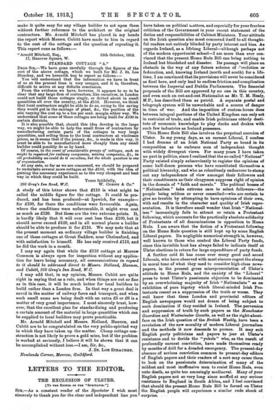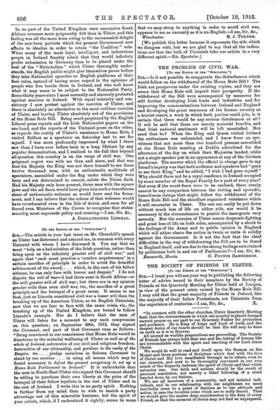LETTERS TO THE EDITOR.
THE EXCLUSION OF ULSTER.
[TO TUE EDITOR. OF THE "SPECTATOR."]
SIR,—As a constant reader of the Spectator I wish most sincerely to thank you for the clear and independent line you
have taken on political 'hatters, and especially for your fearless criticism of the Government in your recent statement of the duties and responsibilities of Cabinet Ministers. Your attitude on the Irish question also must commend itself to all thought- ful readers not entirely blinded by party interest and bias. As regards Ireland, as a lifelong Liberal—although perhaps not of the modern opportunist school—I am more than ever con- vinced that the present Home Rule Bill can bring nothing to Ireland but bloodshed and disaster. Its passage will place an obstacle in the way of any future scheme of ;'evolution or federation, and, knowing Ireland (north and south) for a life- time, I am convinced that its provisions will never be considered as final here, and only lead to endless friction and complication between the Imperial and Dublin Parliaments. The financial proposals of the Bill are approved by no one in this country, and even such an out-and-out Nationalist as Mr. T. M. Healy, M.P., has described them as putrid. A separate postal and telegraph system will be unworkable and a source of danger in time of war. And the imposition of custom-house dues between integral portions of the United Kingdom can only act in restraint of trade, and enable Irish politicians utterly desti- tute of economic knowledge to play ducks and drakes with such few industries as Ireland possesses.
This Home Rule Bill also involves the perpetual coercion of Ulster. In my young days, as an earnest Liberal, I confess I had dreams of an Irish National Party so broad in its composition as to embrace men of independent thought with widely divergent views. For many years I have taken no part in politics, since I realized that the so-called "National" Party existed simply subserviently to register the opinions of some half-dozen persons who have constituted themselves a political hierarchy, and who as relentlessly endeavour to stamp out any independence of view amongst their followers and their constituents as their clergymen suppress right of opinion in the domain of "faith and morals." The political bosses of " Nationalism " take extreme care to select followers—the people being seldom or never consulted—who are certain to give no trouble by attempting to have opinions of their own, with sad results in the character and quality of Irish repre- sentation. It is therefore small wonder that Irish " National- ism " increasingly fails to attract or retain a Protestant following, which accounts for the practically absolute solidarity of Protestants of all denominations in opposition to Home Rule. I am aware that the fiction of a Protestant following on the Home Rule question is still kept up by some English Liberal papers. Its negligible numerical strength is, however, well known to those who control the Liberal Party funds, since this invisible host has always failed to indicate itself at Ulster elections in return for large expenditure of party funds. A further cold fit has come over many good and sound Liberals, who have observed with most sincere regret the slump in moral tone of what they used to consider high-class news- papers, in the present gross misrepresentation of Ulster's attitude to Home Rule, and the anxiety of the "Liberal" press to treat Ulster's passionate objection to be dominated by an overwhelming majority of Irish " Nationalists " as an exhibition of pure bigotry which liberal-minded Irish Pro- testants resent as a suppression of the truth or worse. They well know that these London and provincial editors of English newspapers would not dream of being subject to such domination if they resided in Ireland. The perversion and suppression of truth by such papers as the Manchester Guardian and Westminster Gazette, as well as the right-about- face on the Irish question of the British Weekly, have been a revelation of the new morality of modern Liberal journalism and the methods it now descends to pursue. It may suit English party politicians and papers to jeer at Ulster's resistance and to deride the " yokels " who, as the result of profoundly earnest conviction, have made themselves ready by months of drill for a dreaded emergency. The present-day absence of serious conviction common to present-day editors of English papers and their readers of a sort may cause them to look on the passionate determination of many of the mildest and most inoffensive men to resist Home Rule, even unto death, as quite too amusingly mediaeval. Many of your English papers not so very long since scoffed at any serious resistance to England in South Africa, and I feel convinced that should the present Home Rule Bill be forced on Ulster the English people will experience a similar rude shock of surprise. In no part of the United Kingdom were successive South African reverses more poignantly felt than in Ulster, and this feeling was all the more keen owing to the unconcealed delight of the new-born patriots which the present Government now affects to idealize in order to retain "the Coalition" vote. When many of the most loyal, intelligent, and industrious people in Ireland frankly admit that they would infinitely prefer submission to Germany than to be placed under the heel of the " Nationalism " which Ulster thoroughly under- stands, the English public might give themselves pause before they take Nationalist speeches on English platforms at their face value, instead of having some regard to the opinions of people who live beside them in Ireland, and who well know what it may mean to be subject to the Nationalist Party. Some thirty years since I most earnestly and sincerely protested against coercion in Ireland. With equal intensity and con- sistency I now protest against the coercion of Ulster, and there is absolutely no alternative to the most ruthless coercion of Ulster, and leaving Ulster absolutely out of the provisions of the Home Rule Bill. Being much perplexed by the English Liberal press reports and the Irish Nationalist papers on the one hand, and the reports of the Unionist press on the other, as regards the reality of Ulster's resistance to Home Rule, I visited Belfast as a spectator on Saturday last to see for myself. I was more profoundly impressed by what I there saw than I have ever before been in a long lifetime by any popular demonstration, and I realized to the full that beyond all question this country is on the verge of civil war. One poignant regret was with me then and since, and that was that his Majesty the King was not there himself to see those twelve thousand men, with an enthusiastic multitude of spectators, assembled under the flag under which they were born and are determined to remain, salute the Union Jack. Had his Majesty only been present, those men with the square jaws and the set faces would have given him such a tumultuous cheer of enthusiastic welcome as would have rent the firma- ment, and I can believe that the echoes of that welcome would have reverberated even in the Isle of Arran, and once for all forced even Ministers of the Crown to recognize that states- manship must supersede policy and cunning.—I am, Sir, &c.,
A DISILLUSIONED LIBERAL.















































 Previous page
Previous page